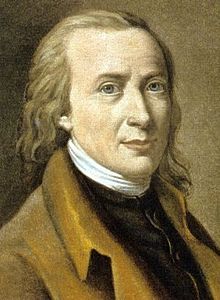Matthias Claudius facts for kids
Quick facts for kids
Matthias Claudius
|
|
|---|---|
 |
|
| Born | 15 August 1740 Reinfeld, Duchy of Holstein |
| Died | 21 January 1815 (aged 74) Free and Hanseatic City of Hamburg |
| Pen name | Asmus |
| Language | German |
| Nationality | German |
| Relatives | Friedrich Christoph Perthes (son-in-law) Carl Wigand Maximilian Jacobi (son-in-law) |
Matthias Claudius (born August 15, 1740 – died January 21, 1815) was a German writer and journalist. He was also known by his pen name, "Asmus." He wrote many poems and essays that were popular because they were easy to understand and often had a mix of humor and serious thoughts.
Contents
The Life of Matthias Claudius
Matthias Claudius was born in Reinfeld, a town near Lübeck, Germany. He later studied at a university in Jena. He spent most of his life in Wandsbeck.
From 1771 to 1775, Claudius worked as an editor for a newspaper called Der Wandsbecker Bote (The Wandsbeck Messenger). In this newspaper, he published many of his own essays and poems. His writings were in simple German. They were very popular with everyday people.
Some of his works were funny and playful. Others were quiet and thoughtful. Later in his life, Claudius became more religious. This made the serious side of his writing even stronger. In 1814, he moved to Hamburg. He lived with his son-in-law, a publisher named Friedrich Christoph Perthes. Matthias Claudius died there on January 21, 1815.
Matthias Claudius's Works
Matthias Claudius wrote many famous poems. One of his poems is called Death and the Maiden. A famous composer named Franz Schubert used this poem in 1817 to create one of his best-known songs. This song then inspired a string quartet in 1824.
All of Claudius's collected works were published under a long title. It was Asmus omnia sua secum portans, oder Sämtliche Werke des Wandsbecker Boten. This means "Asmus carrying all his things with him, or All the Works of the Wandsbeck Messenger."
Famous Poems
Here are some of Matthias Claudius's well-known poems:
- Abendlied ("Evening Song"), also known as "Der Mond ist aufgegangen" ("The moon has risen")
- "Der Mensch lebt und bestehet" ("Man lives and exists"), which was set to music by Max Reger
- "Christiane"
- "Die Sternseherin Lise" ("Lise the astrologer")
- "Die Liebe" ("Love")
- "Der Tod" ("Death")
- "Ein Wiegenlied bei Mondschein zu singen" ("A lullaby to sing in moonlight")
- "Täglich zu singen" ("To be sung every day")
- "Kriegslied" ("Song of war")
- "Der Frühling. Am ersten Maimorgen" ("The Spring. On the first morning in May")
- "Der Säemann säet den Samen" ("The sower sows the seeds"), set to music by Ernst Krenek
- "Der Tod und das Mädchen" ("The Death and the maiden"), set to music by Schubert
- "Wir pflügen und wir streuen" ("We plough the fields and scatter" - sung as a harvest festival hymn in Germany and England)
Honours and Recognition
- An asteroid, 7117 Claudius, was named after him.
See also
 In Spanish: Matthias Claudius para niños
In Spanish: Matthias Claudius para niños
 | May Edward Chinn |
 | Rebecca Cole |
 | Alexa Canady |
 | Dorothy Lavinia Brown |

